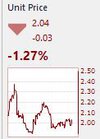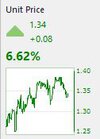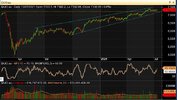MovingAverage
Just a retail hack
- Joined
- 23 January 2010
- Posts
- 1,315
- Reactions
- 2,565
This post is aimed more at the newer traders that may be on the site. If you or your systems have been struggling lately to be profitable, don't be discouraged. It takes time and experience to remain profitable in markets like the present. This is all part of the learning process.
View attachment 127282
.
I feel the pain--H1 of this year has certainly been a grind for two of my systems. Both had a great H2 last year, but boy it's been tough so far this year. I guess it isn't all bad, one system might be down 1.27% but the other is up 6.62%. Let's hope H2 of this year brings home a better result.




